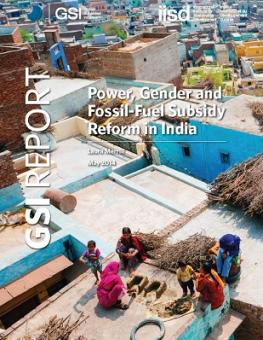
Power, Gender and Fossil-fuel Subsidy Reform in India
This paper explores the link between fossil-fuel subsidies and gender in India.
It focuses on the likely gender impacts of reform across cooking, lighting, pumping and transport fuels. Research finds subsidies have provided little benefit to the rural population and to the poor, especially to two thirds of people who rely on biomass for cooking. Reform of subsidies should mitigate negative impacts of reform for women, and rather increase access to sustainable energy and empowerment of women. Benefit transfer schemes, designed to compensate fuel users, have not reached women due to a lack of financial inclusion. The report describes existing efforts around gender budgeting within the energy sector, and analyses available time-use and energy household survey data.
You might also be interested in
Increased Support Needed to Achieve India's Clean Energy Goals
India is on track to achieve many of its 2030 clean energy goals but needs to step up government support measures to accelerate the deployment of offshore wind, electric vehicles, and green hydrogen, according to a new report.
India Faces Clean Energy Challenges as Energy Demand Soars and Global Fossil Fuel Subsidies Rise
New research finds the global energy crisis and increasing energy demand have pushed India's energy subsidies to a 9-year high.
G20 energy ministers call for cooperation on nuclear energy & low-emission hydrogen
The Group of 20 energy ministers' meeting concluded in Goa on July 22, 2023, with the final summary failing to include language on the phase-down of unabated fossil fuels.
Implementing Solar Irrigation Sustainably
This guidebook provides recommendations to state policy-makers on how they can implement solar irrigation models, particularly decentralized solar plants for irrigation under the PM-KUSUM scheme, effectively and sustainably.